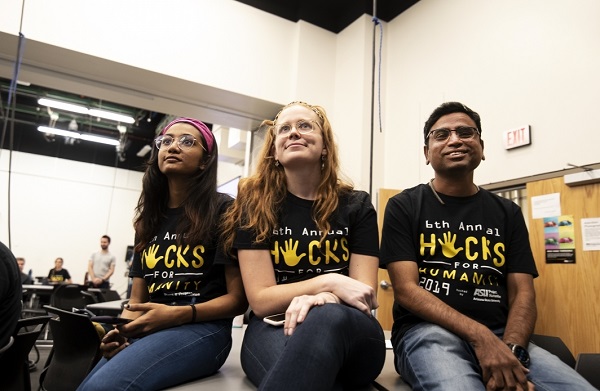Hacks for Humanity 2020: a virtual mash-up of tech and social change
If you’re not involved in the world of technology, you might think of hacking as something that only involves coding, but Project Humanities’ annual Hacks for Humanity: Hacking for the Social Good event reminds us that anyone can and should get involved.
October 9–11 Project Humanities will host participants from different professions, ages, communities and backgrounds online for a weekend of creating solutions to big social challenges. Hacks for Humanity welcomes anyone to join them, whether you’re a coder, non-coder, designer, business owner, up-and-coming entrepreneur, engineer, artist, humanist, futurist or anything in between. Everyone is invited to participate! This event provides an opportunity to cultivate interconnection between generations, fields and experiences. It is also a great way to meet new people, network and build a stronger community during a time when these relationships feel especially necessary and urgent.
Dr. Neal A. Lester, founding director of Project Humanities, said that this year will build on the interdisciplinary foundation that his team has set for the last several years.

From left: Alleyway co-creators Sanjana Saurin Shah, Molly Luther and Sidharth Ughade await the judges' decisions at Hacks for Humanity 2019. Photo by Alisa Reznick
“Like other life hacks, this event is about building something to make something better. What makes this hacking event unique is the wide audience welcomed and the fact that teams are neither pre-assembled or challenges prescribed,” he said.
Participants in this year’s Hacks for Humanity event will be randomly assigned to teams of five. The result of each team’s efforts must personify three of the seven principles in Project Humanities’ Humanity 101 Movement — empathy, compassion, respect, integrity, forgiveness, kindness and self-reflection. The team tracks this year are ageing, safety and justice, and Lester said that these tracks respond to what’s happening in the world now regarding COVID-19 and the crisis in racial justice.
Because Hacks for Humanity is being held in a virtual setting this year, participants, mentors and volunteers can join from around the globe, making this year especially unique. This free event is open to anyone, from high school juniors (with a guardian’s permission) to retirees.
Rachel Sondgeroth, Project Humanities’ program coordinator and the manager of events technology, began working on the event as an undergraduate at ASU. She recently graduated with her degree in religious studies and global studies. She said the pivot to a virtual platform was a lot of work but was also an opportunity for growth for the already popular event.
“Our shift to virtual programming has challenged us to find ways to keep events engaging from afar. We're grateful for this opportunity to expand the methods of our programming, and we're excited to see what fresh, new ideas come from it,” she said.
Mohit Doshi, an ASU computer science major and hackathon participant, said Hacks for Humanity sparked an interest in more like-minded events.
“Hacks for Humanity 2017 was my first hackathon ever. I was a freshman and my experience with Hacks for Humanity led me to pursue many more hackathons and compete in events across the state and country,” Doshi said.
If you would like to participate in this year’s event, you can expect to work with your peers on projects that are both innovative and ambitious. Those involved will have the opportunity to participate in games and website and canvas business model design. You will also be able to talk and hear about misconceptions in the technological world along with entrepreneurial myths.
To top it all off, you could possibly win $10,000 in cash prizes and best of all, have a weekend full of fun for a good cause while meeting new friends.
“I formed a team with four other people who I had never met before. All of us were from different backgrounds. Each person contributed something to the project that was unique to their background,” Doshi said. “There were programmers, a language major, a business major. I liked how everyone’s contributions culminated to create something that was not only a new idea but also implementable.”
Since mid-March, when in-person events were replaced with virtual events because of the pandemic, Project Humanities continued to deliver new ways to connect with the community with its summer Podcast Club, along with planning this year’s Hacks for Humanity event. Recent dialogues from Project Humanities have engaged people from across the state, country and globe to join their current conversations and have included Black parenting and corporal punishment, death and dying, menstrual equity, youth mental health and academic pressures and police departments' sexual assault investigative practices.
To participate in this year’s Hacks for Humanity event, you can register now to hack or help organize. And if you’d like to learn more, take a look at Project Humanities’ fall event calendar.